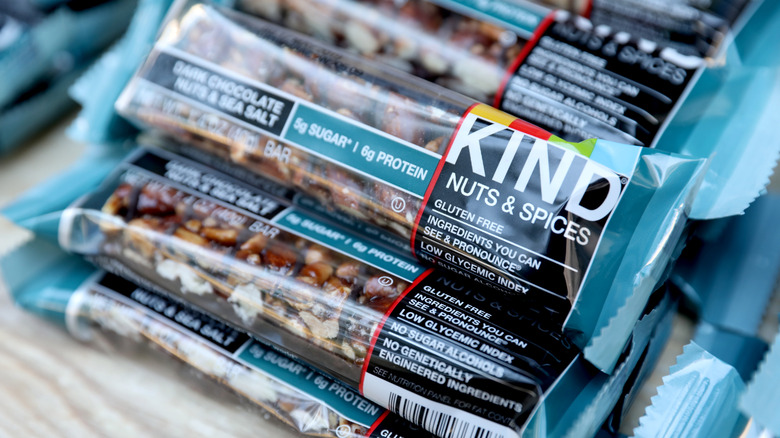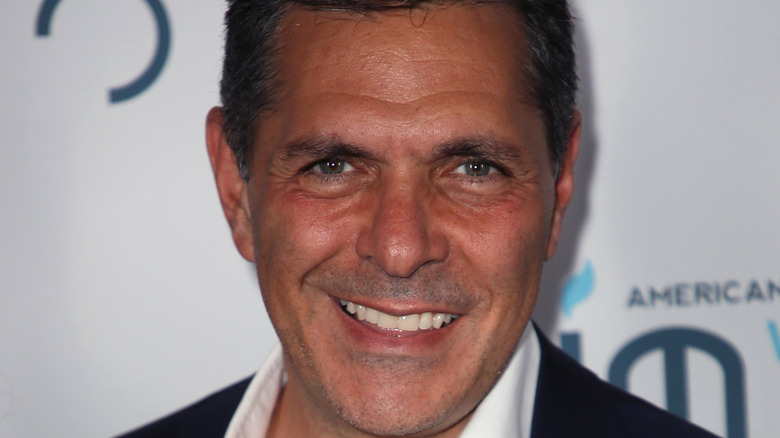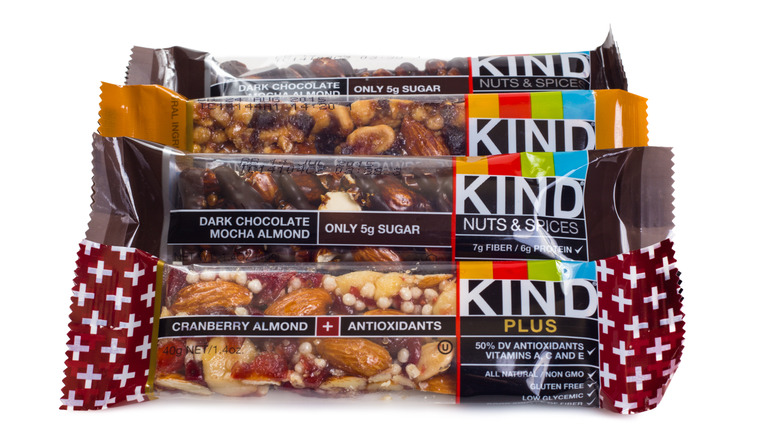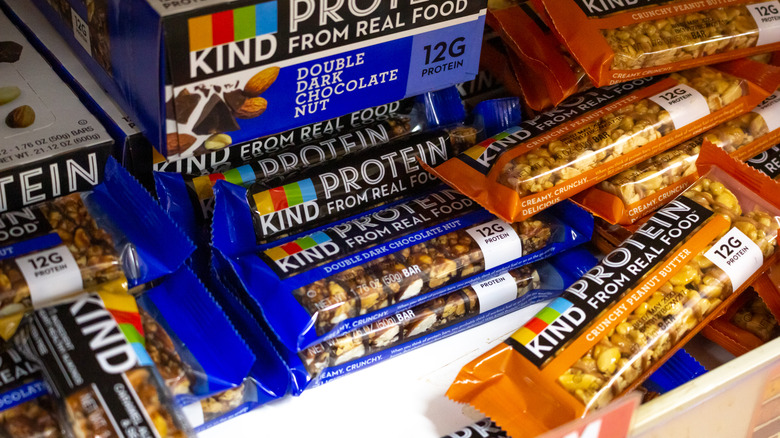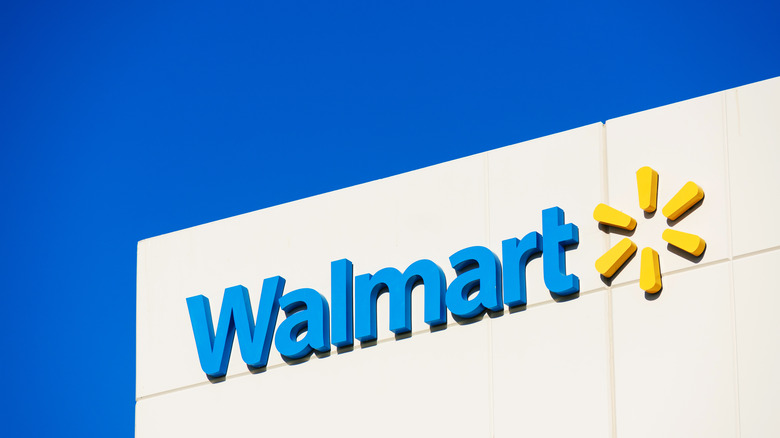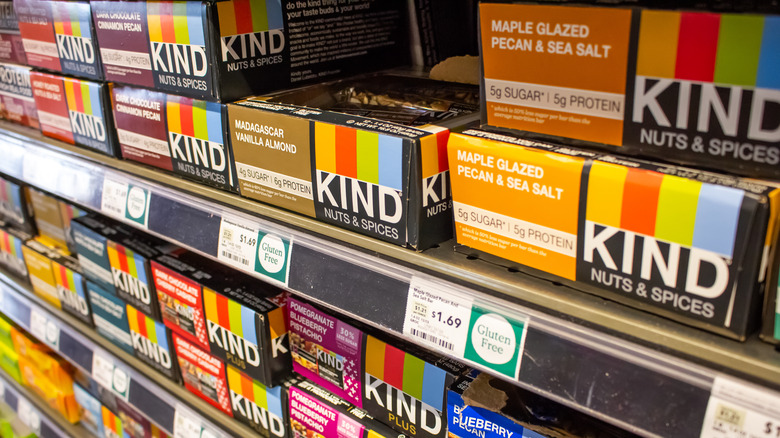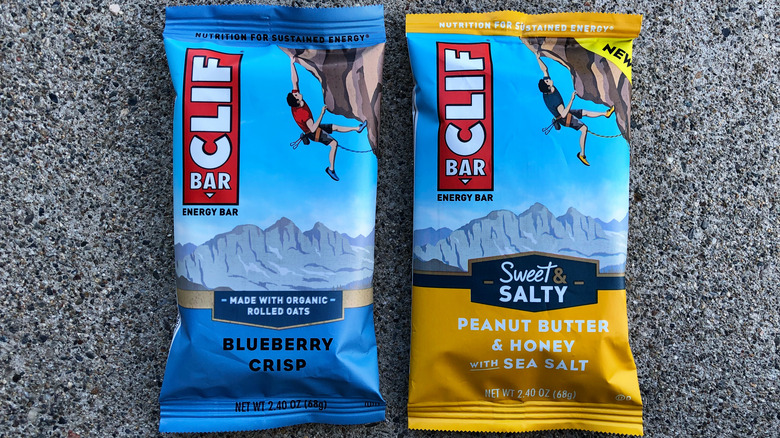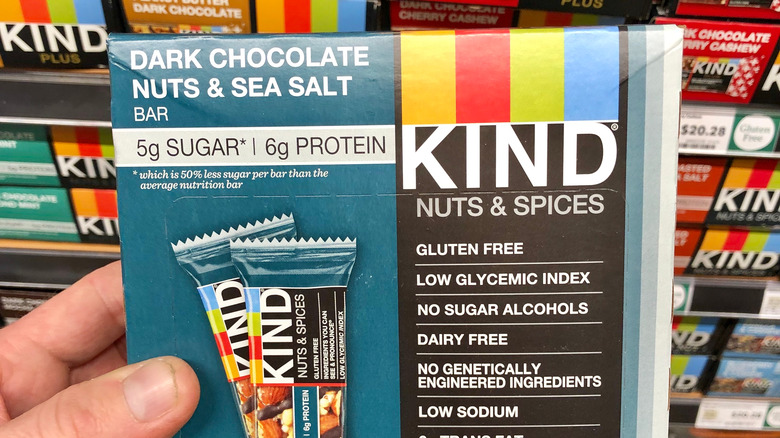The Untold Truth Of KIND Bars
There's no dearth of snack bars and meal replacement bars on the market today, but KIND bars stand out for a number of reasons. According to some nutrition experts, KIND bars are one of the healthiest snack bar options today; they are widely available across stores such as Target and Walmart (as per Business of Business).
They can typically be found amid the confectionary selection at the drugstore checkout next to classic candy bars such as Twix and Butterfingers. It's not just the healthful, crunchy allure of KIND bars that makes them special. Behind all that delicious nutrition is a company that actually incarnates the value of kindness. In fact, KIND has spent quite a bit of time, money, and effort ensuring that its business ethos champions kindness. The brand has made its way through years of snags, accusations, and even legal battles, and has managed to emerge relatively unscathed.
KIND's founder is the son of a Holocaust survivor
In 2004, Daniel Lubetzky started KIND with nothing more than a dream and a phenomenal work ethic, not to mention a desire to found a business built on the value of kindness. Lubetzky attributes this value, which is so integral to his ethos, to his father, who faced internment at the Dachau concentration camp and survived due to the unexpected kindness of a German soldier (as per USA Today).
Lubetzky's father was a child in Dachau when a Nazi soldier snuck him a rotten potato (via The Times of Israel). It might not sound like much of a gift, but the guard who gave Lubetzky's father the vegetable likely would have been punished if it had been discovered he was helping an imprisoned Jew. The elder Lubetzky attributes his survival to that guard and the potato, and it's this story that the young Lubetzky keeps in mind while cultivating his company culture.
The company's culture reflects its name
Kindness is at the core of the company culture at KIND. Daniel Lubetzky details many tips for a KIND company culture in his book, "Do the KIND Thing." Lubetzky delved into four key aspects of KIND culture for USA Today; giving feedback in a productive way rather than making criticism personal, reevaluating the mindset surrounding the termination of employment, cultivating empathy, and always being willing to pitch in and help, which, he says, helps establish a deeply entrenched culture of respect within the office.
He said, "Some might say that if I'm doing something that isn't necessarily 'CEO-like,' then I am being inefficient and failing to delegate. For the KIND culture, though, it works to highlight that there's no task too small or insignificant for me — or any of us — to do."
According to The Business of Business, Lubetzky's devotion to kindness is also at the root of "the KIND Movement," which encourages people to recognize and reward random acts of kindness. The company had reportedly had a hand in 17 million "everyday acts of kindness" as of late 2021.
They sell a wide variety of bars
Daniel Lubetzky founded his snack company in 2003 due to his frustration with the lack of healthy, convenient, preservative-free snacks present on the market (via The Business of Business). Originally stocked in just a handful of Whole Foods locations, the company has since grown to being sold at various retailers. The company has also developed a wide variety of bars.
The KIND website allows consumers to navigate through snack options based on a number of different criteria in order to find the perfect snack. Snackers can opt for one of three different textures — soft, chewy, and crunchy — as well as whether they're looking for high protein or high fiber bars, in addition to choosing the amount of added sugar they're comfortable with. Some of KIND's bars are made with a simple combo of nuts or nuts and fruit, while others also have a nut butter filling. But the top seller, according to the company, is the Dark Chocolate Nuts and Sea Salt bar.
KIND's first deal with Walmart fell through
KIND's story may be heartwarming, but in 2008, a major wrench was thrown in the works. It all started with an exciting partnership with Walmart, the top retailer in the U.S. as of 2021, boasting a whopping 14% of the retail market (via RIS News). According to The Business of Business, KIND had started selling their bars in Walmart in 2007, only to have the retailer renege on the deal in 2008.
This, as Daniel Lubetzky told Business Insider, was due to the fact that there were no nutrition bar sections in stores at the time, which meant that KIND was lumped in with the candy bars and stocked next to them in Walmart stores. Additionally, at the time, KIND was a fledgling company and was unaccustomed to providing the order sizes that Walmart needed, which caused supply issues.
In order to stay afloat, Lubetzky had to sell a third of the business to VMG Partners and Vitaminwater for a $15 million windfall in 2008. KIND bounced back in four years — as of April 2012, KIND bars had become a mainstay for Walmart. Additionally, Lubetzky was bought back the minority stake in 2014.
The FDA warned KIND about misleading health claims
The Walmart snafu wasn't the first time KIND faced problems (as per The Business of Business). In 2015, Daniel Lubetzky received a warning letter from the FDA, which accused the company of labeling at least four of its products with misleading information (via Natural Products Insider).
In the letter, the FDA noted that KIND's labeling of their bars as healthy was incorrect due to the fat content in the bars. More than 15% of the calories in KIND bars came from fat due to them being made mainly with nuts, which exceeded the 15% fat content threshold that the FDA requires in order for a product to be classified as healthy.
Lubetzky immediately published a response online, noting that the company was "fully committed" to working with the FDA to meet the agency's requirements (as per USA Today). He said, "We're also taking it upon ourselves to conduct a thorough review of all of our snack food labels and website information to ensure that they're compliant."
They fought back against the FDA allegations -- and won
When Daniel Lubetzky received the letter from the FDA claiming he'd been mislabeling his bars, he immediately removed the contested references from their packaging (as per The Business of Business). However, he had found a new crusade — to change the FDA's outdated definitions of healthy foods. The FDA, at the time, did not distinguish between healthy and unhealthy fats. According to many experts, the accusation that KIND bars were unhealthy due to their high-fat content was based on outdated science (via NPR).
"I would be hard-pressed to find a colleague who doesn't agree with me that nuts are one of the healthiest foods on the planet," nutritionist Cynthia Sass wrote for Health. "On the flip side, many foods that are low in total and saturated fat, and meet the criteria for the term 'healthy,' are foods I wouldn't recommend because they don't meet my clean eating standards." And, after filing a Citizen Petition to this effect, KIND was able to get the FDA to reverse its decision.
Clif 'invited' them to go organic in 2019
Whether it's McDonald's v. Burger King or Pepsi v. Coke, there's nothing quite like a public battle between two heavy-hitting brands. The rivalry between Clif and KIND is no different, and has sometimes been heavy on the passive aggression: In 2019, the former "invited" the latter to commit to using organic ingredients through a full-page advertisement in the form of an open letter that was published in The New York Times (via Forbes). The letter challenged KIND to "do a truly kind thing and make an investment in the future of the planet and our children's children by going organic."
However, KIND still hasn't taken the bait and gone organic, writing on its website that it is "not currently pursuing organic certification for our snacks." The site also states, "Our top priority is to invest in high quality, premium ingredients, while keeping our products accessible. We work closely with our suppliers to ensure that their standards are in line with KIND's brand values."
KIND was acquired by Mars Inc. in 2020
According to The Business of Business, Daniel Lubetzky was once again the full owner of his business in 2014 after repurchasing the 30% stake he had sold in 2008; however, in 2020, he made the decision to sell his remaining 51% KIND stake to Mars Inc. As per a press release, KIND was acquired by Mars Inc. in November 2020 after a three-year partnership that saw the company expand globally and launch new products including KIND Bark, KIND Frozen Bars, and KIND Smoothie Bowls.
"I am so proud of how well the Mars and KIND teams have complemented and strengthened each other over the past three years," said Lubetzky. "We are now well positioned to further advance our efforts and continue building a foremost health and wellness platform."
Mars Inc. has been a "notoriously private" company in the century it's been around, but it opted to begin evolving towards more transparency in 2018 (via Business Insider). In 2021, Mars Inc. was accused of profiting from child labor by eight former Malian workers, Bloomberg reports, so it seems the company might need to take a page (or several) out of Lubetzky's book if they're going to walk the KIND walk!
